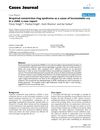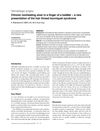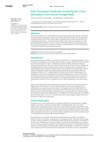 7 citations,
August 2008 in “Cases Journal”
7 citations,
August 2008 in “Cases Journal” A hair tightly wrapped around a toddler's toe caused severe crying and was treated by surgery.
 7 citations,
November 2003 in “Current Opinion in Obstetrics & Gynecology”
7 citations,
November 2003 in “Current Opinion in Obstetrics & Gynecology” Metformin helps improve symptoms and reproductive outcomes in people with polycystic ovary syndrome.
 7 citations,
January 1992 in “Adolescent and pediatric gynecology”
7 citations,
January 1992 in “Adolescent and pediatric gynecology” Early diagnosis and treatment of PCOS in teenagers can help prevent more severe adult PCOS.
 6 citations,
January 2018 in “Annals of dermatology/Annals of Dermatology”
6 citations,
January 2018 in “Annals of dermatology/Annals of Dermatology” Hyaluronic acid filler can safely and effectively improve facial contour in Parry-Romberg Syndrome.
 6 citations,
January 2012 in “Annals of Indian Academy of Neurology”
6 citations,
January 2012 in “Annals of Indian Academy of Neurology” Women with epilepsy on certain medications might gain weight and have higher thyroid-stimulating hormone levels, but not more polycystic ovarian syndrome.
 5 citations,
February 2019 in “PloS one”
5 citations,
February 2019 in “PloS one” Bald thigh syndrome in sighthounds is caused by structural defects in hair shafts due to downregulated genes and proteins.
 5 citations,
October 2018 in “Sains Malaysiana”
5 citations,
October 2018 in “Sains Malaysiana” Testosterone reduces key molecules needed for early pregnancy in rats.
 4 citations,
January 2022 in “Open Health”
4 citations,
January 2022 in “Open Health” Eating healthy, exercising, and changing behaviors are the best first steps to treat Polycystic Ovary Syndrome (PCOS).
 4 citations,
July 2019 in “Children (Basel)”
4 citations,
July 2019 in “Children (Basel)” The review concludes that more research is needed to better improve the health outcomes for people with Polycystic Ovarian Syndrome.
 4 citations,
November 2016 in “Archives of Endocrinology and Metabolism”
4 citations,
November 2016 in “Archives of Endocrinology and Metabolism” Insulin resistance is linked to larger thyroid volume in patients with polycystic ovary syndrome.
 4 citations,
November 2012 in “Obstetrics, Gynaecology & Reproductive Medicine”
4 citations,
November 2012 in “Obstetrics, Gynaecology & Reproductive Medicine” Lifestyle changes and clomiphene are first-line treatments for infertility in women with PCOS, with other options available if these fail.
 4 citations,
October 2008 in “International Journal of Dermatology”
4 citations,
October 2008 in “International Journal of Dermatology” A toddler's chronic finger ulcer was successfully treated after removing a hair causing hair-thread tourniquet syndrome.
 3 citations,
February 2018 in “InTech eBooks”
3 citations,
February 2018 in “InTech eBooks” Traditional Chinese Medicine and acupuncture may improve Polycystic Ovarian Syndrome symptoms and reduce costs, but more research is needed.
 3 citations,
December 2011 in “Journal of Gynecologic Surgery”
3 citations,
December 2011 in “Journal of Gynecologic Surgery” Three to five ovarian punctures are best for improving fertility in women with PCOS without harming the ovaries.
 3 citations,
June 2004 in “Reviews in gynaecological practice”
3 citations,
June 2004 in “Reviews in gynaecological practice” Early treatment and weight management are important for teenagers with PCOS to reduce symptoms and long-term health risks.
 2 citations,
December 2021 in “Case reports in endocrinology”
2 citations,
December 2021 in “Case reports in endocrinology” The girl's condition improved with treatment, showing no new autoimmune diseases and hair regrowth.
 2 citations,
January 2017 in “Cambridge University Press eBooks”
2 citations,
January 2017 in “Cambridge University Press eBooks” Manage PCOS in primary care with weight loss, psychological support, medication, and monitoring for health risks.
 2 citations,
September 2009 in “Nurse Prescribing”
2 citations,
September 2009 in “Nurse Prescribing” PCOS affects many women, causing various symptoms and health risks, and is managed through lifestyle changes, medication, and support groups.
 1 citations,
April 2022 in “Rheumatology”
1 citations,
April 2022 in “Rheumatology” A man developed autoimmune symptoms after the Pfizer COVID-19 vaccine, highlighting the need for thorough vaccine safety checks.
 1 citations,
June 2019 in “Innovare journal of medical sciences”
1 citations,
June 2019 in “Innovare journal of medical sciences” Polycystic Ovary Syndrome (PCOS) is a hormonal disorder in women that can cause infertility and other health issues, and it may be improved by treatments that increase insulin sensitivity.
 1 citations,
February 2018 in “InTech eBooks”
1 citations,
February 2018 in “InTech eBooks” PCOS in lean women is a serious health condition with implications beyond fertility, affecting metabolism and increasing cardiovascular disease risk.
 February 2024 in “Curēus”
February 2024 in “Curēus” Prompt diagnosis and treatment of hair tourniquet syndrome involving the uvula are crucial to prevent severe complications.
 December 2023 in “Research in pharmacy”
December 2023 in “Research in pharmacy” Phytotherapeutic compounds and supplements can help manage Polycystic Ovarian Syndrome (PCOS).
 October 2023 in “International Journal For Multidisciplinary Research”
October 2023 in “International Journal For Multidisciplinary Research” Women with PCOS face many health risks, but exercise, a healthy diet, and weight management can help.

PCOS requires personalized treatment to improve life quality and reduce health risks.
 September 2022 in “International Journal of Health Sciences and Research”
September 2022 in “International Journal of Health Sciences and Research” Resistance training improved BMI and menstrual regularity more in women with PCOS than aerobic training.
 January 2022 in “Journal of current research in food science”
January 2022 in “Journal of current research in food science” Eating healthy and exercising can help manage Polycystic Ovarian Syndrome and its related health problems.
 April 2021 in “Journal of evolution of medical and dental sciences”
April 2021 in “Journal of evolution of medical and dental sciences” Women with PCOS have higher levels of certain androgens, which are good at predicting excess hair growth.
 January 2021 in “Journal of Scientific Research of the Banaras Hindu University”
January 2021 in “Journal of Scientific Research of the Banaras Hindu University” Lifestyle changes and medical treatment can help manage PCOS symptoms in young adults.

Eating healthy, exercising, and certain nutrients like myoinositol and omega-3s can help manage PCOS symptoms.






























